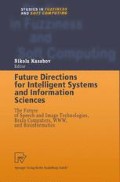Abstract
The study is concerned with the fundamentals of granular computing. Granular computing, as the name itself stipulates, deals with representing information in the form of some aggregates (embracing a number of individual entitites) and their processing. We elaborate on the rationale behind granular computing. Next, a number offormal frameworks of information granulation are discussed including several alternatives such as fuzzy sets, interval analysis, rough sets, and probability. The notion of granularity itself is defined and quantified. A design agenda of granular computing is formulated and the key design problems are raised. A number of granular architectures are also discussed with an objective of dealinating the fundamental algorithmic and conceptual challenges.It is shown that the use of information granules of different size (granularity) lends itself to general pyramid architectures of information processing. The role of encoding and decoding mechanisms visible in this setting is also discussed in detail along with some particular solutions. The intent of this paper is to elaborate on the fundamentals and put the entire area in a certain perspective while not moving into specific algorithmic details.
Access this chapter
Tax calculation will be finalised at checkout
Purchases are for personal use only
Preview
Unable to display preview. Download preview PDF.
References
Buckley, J., Hayashi, Y. (1994) Fuzzy neural networks: a survey, Fuzzy Sets and Systems, 66, 1–14.
Harris, C.J., Moore, C.G., Brown, M. (1993) Intelligent Control - Aspects of Fuzzy Logic and Neural Nets, World Scientific, Singapore.
Jang, J. S. R., Sun, C. T., Mizutani, E. (1997) Neuro-Fuzzy and Soft Computing Prentice Hall, Upper Saddle River, NJ.
Kandel, A.(1986) Fuzzy Mathematical Techniques with Applications, Addison Wesley, Reading, MA.
Kasabov, N. (1996) Foundations of Neural Networks, Fuzzy Systems, and Knowledge Engineering, MIT Press, Cambridge, MA.
Kruse, R., Gebhardt, J., Klawonn, F. (1994) Foundations of Fuzzy Systems, J. Wiley, Chichester.
Pedrycz, W (1997). Computational Intelligence: An Introduction, CRC Press, Boca Raton, FL.
Pedrycz, W., Gomide, F. (1998) An Introduction to Fuzzy Sets, Cambridge, MIT Press, Cambridge, MA.
Pedrycz, W., Smith, M. H. 1999. Granular correlation analysis in data mining, Proc. 18 th Int Conf of the North American Fuzzy Information Processing Society (NAFIPS), New York, June 1–12, pp. 715–719.
Pedrycz, W., Vukovich, G. (1999) Quantification of fuzzy mappings: a relevance of rule-based architectures, Proc. 18 th Int Conf of the North American Fuzzy Information Processing Society (NAFIPS), New York, June 1–12, pp. 105–109.
Tsoukalas, L.H., Uhrig, R.E. (1997) Fuzzy and Neural Approaches in Engineering, J. Wiley, New York.
Zadeh, L. A. (1979) Fuzzy sets and information granularity, In: M.M. Gupta, R.K. Ragade, R.R. Yager, eds., Advances in Fuzzy Set Theory and Applications, North Holland, Amsterdam, 3–18.
Zadeh, L. A. (1996) Fuzzy logic = Computing with words, IEEE Trans. on Fuzzy Systems, vol. 4, 2, 1996, 103–111.
Zadeh, L. A. (1997) Toward a theory of fuzzy information granulation and its centrality in human reasoning and fuzzy logic, Fuzzy Sets and Systems, 90, 1997, 111–117.
Author information
Authors and Affiliations
Editor information
Editors and Affiliations
Rights and permissions
Copyright information
© 2000 Springer-Verlag Berlin Heidelberg
About this chapter
Cite this chapter
Pedrycz, W. (2000). Granular Computing : An Introduction. In: Kasabov, N. (eds) Future Directions for Intelligent Systems and Information Sciences. Studies in Fuzziness and Soft Computing, vol 45. Physica, Heidelberg. https://doi.org/10.1007/978-3-7908-1856-7_15
Download citation
DOI: https://doi.org/10.1007/978-3-7908-1856-7_15
Publisher Name: Physica, Heidelberg
Print ISBN: 978-3-7908-2470-4
Online ISBN: 978-3-7908-1856-7
eBook Packages: Springer Book Archive

